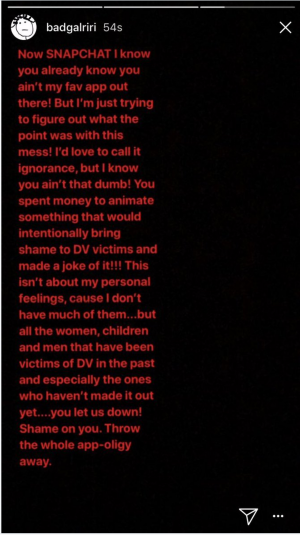Social media app Snapchat recently came under fire when one of its tasteless adverts made a joke out of singer Rihanna’s previous relationship with Chris Brown. It brought to light many relevant problems around Domestic Violence and how it is often a subject of throwaway jokes in society.
The singer and influencer spoke out on Instagram talking about why those kinds of jokes are never okay. Here’s what went on and why Domestic Violence should never be a ‘joke’ and how it affects the lives of so many people in the UK.
Snapchat’s Tone-deaf humour mocking Rihanna and Chris Brown
In an advertising poll attempting to engage its audience, Snapchat’s “Would You Rather” poll invited users to vote if they would rather “Slap Rihanna” or “Punch Chris Brown.”

Naturally, Rihanna took to social media to criticise the stupidity of the app and since then, Snapchat deleted the post.
As a result, the company’s share value dropped by 3.64 percent, the equivalent of roughly $754 million – a significant decline thanks to this post from Rihanna:

“…I’m just trying to figure out what the point was with this mess! I’d love to call it ignorance, but I know you ain’t that dumb! You spent money to animate something that would intentionally bring shame to DV [domestic violence] victims and made a joke of it!!! This isn’t about my personal feelings, cause I don’t have much of them…but all the women, children and men that have been victims of DV in the past and especially the ones who haven’t made it out yet…you let us down! Shame on you.”
Domestic Violence is never a joke
According to the ONS, an estimated 1.9 million adults aged 16 to 59 years experienced domestic abuse in the last year, according to the year ending March 2017 Crime Survey for England and Wales (1.2 million women, 713,000 men).
The reason it is such a danger to people is because it’s often a hidden crime not reported to the police. People who are victimised by domestic violence are often physically and emotionally manipulated by their partner which makes it hard for them to leave. Therefore the estimated number of victims is always higher than the number of incidents reported by the police.
How to recognise DV in a relationship
Even when it’s your own relationship, it’s sometimes difficult to spot domestic violence. We’ve highlighted these tell-tale signs from Women’s Aid on how you can recognise abuse and what you can do about it.
- Destructive criticism and verbal abuse: shouting; mocking; accusing; name calling; verbally threatening.
- Pressure tactics: sulking; threatening to withhold money, disconnecting the phone and internet, taking away or destroying your mobile, tablet or laptop, taking the car away, taking the children away; threatening to report you to the police, social services or the mental health team unless you comply with his demands; threatening or attempting self-harm and suicide; withholding or pressuring you to use drugs or other substances; lying to your friends and family about you; telling you that you have no choice in any decisions.
- Disrespect: persistently putting you down in front of other people; not listening or responding when you talk; interrupting your telephone calls; taking money from your purse without asking; refusing to help with childcare or housework.
- Breaking trust: lying to you; withholding information from you; being jealous; having other relationships; breaking promises and shared agreements.
- Isolation: monitoring or blocking your phone calls, e-mails and social media accounts, telling you where you can and cannot go; preventing you from seeing friends and relatives; shutting you in the house.
- Harassment: following you; checking up on you; not allowing you any privacy (for example, opening your mail, going through your laptop, tablet or mobile), repeatedly checking to see who has phoned you; embarrassing you in public; accompanying you everywhere you go.
- Threats: making angry gestures; using physical size to intimidate; shouting you down; destroying your possessions; breaking things; punching walls; wielding a knife or a gun; threatening to kill or harm you and the children; threatening to kill or harm family pets; threats of suicide.
- Sexual violence: using force, threats or intimidation to make you perform sexual acts; having sex with you when you don’t want it; forcing you to look at pornographic material; constant pressure and harassment into having sex when you don’t want to, forcing you to have sex with other people; any degrading treatment related to your sexuality or to whether you are lesbian, bisexual or heterosexual.
- Physical violence: punching; slapping; hitting; biting; pinching; kicking; pulling hair out; pushing; shoving; burning; strangling, pinning you down, holding you by the neck, restraining you.
- Denial: saying the abuse doesn’t happen; saying you caused the abuse; saying you wind him up; saying he can’t control his anger; being publicly gentle and patient; crying and begging for forgiveness; saying it will never happen again.
If you or a loved one is suffering from domestic violence, visit the NDV Helpline












